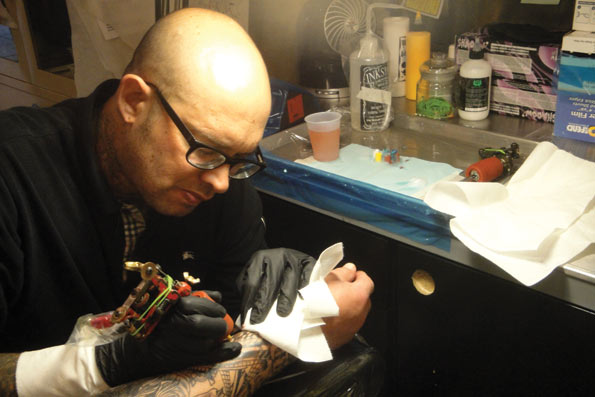Tattoos may pose new health risk

By Anna Shoriak
The Guardsman
Tattoos have been around for over 5,000 years as a popular, expressive art form, however, according to recent reports, tattooing could become better known for the life-threatening risks associated with the ink.
In July of 2011, German scientists from the Department of Dermatology, at the University of Regensburg released the results of lab tests on black tattoo ink, which were rather unsettling. Of the 14 commercially available inks tested, all were found to contain trace amounts of the chemical dubutyl phthalate, an industrial plasticizer added to increase fluidity in printing inks and adhesives. Dubutyl Phthalate is also under suspicion of being an endocrine disruptor, which is known to mimic estrogen, disrupt testosterone, cause severe ADD and other learning disabilities. Benzo(a)pyrene, a well-documented skin carcinogen routinely used in animal tests to grow tumors, was also found present in black inks.
The scientists identified traces of lead in 17 different black inks, as well as nickel, chromium, titanium, cadmium and many other heavy metals.
Talor Nicols, licensed tattoo artist at Let It Bleed Tattoo on Polk Street in San
Francisco had this to say about ink concerns: “It’s all bullshit.”
Nicols, who is colorfully tattooed from her neck down has always been an artist. She’s been working in various shops since 2000, and has been tattooing for 5 years. Her employment with Let It Bleed Tattoo started when the shop opened up 2 and half years ago.
“Most of the inks that were causing allergic reactions in clients have since been taken off the U.S. market”, she explained. She showed concern about the study because it was conducted in Germany. Nicols questioned the fact that not all ink is available in all countries.
“I have fellow artists request that I bring particular inks over for them, because they are unable to find them in their country,” said Nicols. “I know the ink companies and distributors I work with, and usually the inks we use in our shop are organic or vegan inks.”
To purchase the inks, she is required to prove she is a licensed tattoo artist who works in a legitimate tattoo shop.
“There is a definite level of accountability between this shop, our ink suppliers and myself. I know that if I have an issue, I can directly call the person who mixed my ink for me,” Nicols said.“I speak for everyone in this shop when I say that we go above and beyond to uphold the highest standards. I welcome any questions a current or future client may have.”
Bryan “Ransom” White, a freelance tattoo artist of 15 years, said he heard about the recent studies, “I’m unable to find concrete proof that tattoos cause cancer. The idea of it is scary, and it is something that should definitely be looked into. It makes you question why the government hasn’t taken action already. Most people know the potential risks associated with tattoos. The only safe tattoo is henna, and that has yet to be FDA approved.”
Sasha Merritt is an author, licensed tattoo artist and the owner of Dragonfly Ink located in San Francisco’s Union Square. Merritt welcomes these studies stating, “I think it is always good to take a look at what we put into and onto our bodies. Taking a look at pigments for tattooing is a good thing. Millions of people have been tattooed and the amount of negative reactions is very low. In the 14 years I’ve been tattooing, I’ve only had two people have any kind of reaction.”
The FDA has no current regulations on tattoo inks, which are considered cosmetic, unlike drugs which are subject to approval before they hit the market. Tattoo ink and make-up companies are only required to list their ingredients, leaving safety responsibilities to the manufacturer.
Drug companies have the luxury of the FDA taking full responsibility. Tattoo pigment, on the other hand are supposed to be approved before becoming available on the market.
However, the FDA, “traditionally has not exercised it’s regulatory authority over tattoo inks or the pigments used in them.”
California has the strictest regulations regarding exposure to carcinogenic chemicals. Proposition 65 requires all tattoo shops to warn customers of the potential risk of carcinogenic exposure, by signing a release.
Sarah Blevins is the proud owner of many tattoos: a black cat wearing a fez hat on her calf, a moth on her upper shoulder, and a humming bird on her bicep. She said she “plans on getting more tattoos. I actually read the study online and it did made me think, but I still plan on getting one done, maybe even next week.”

Comments are closed.